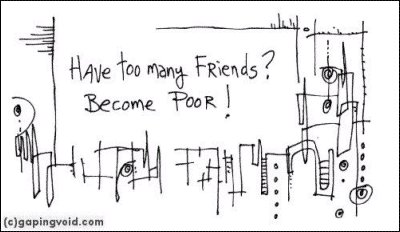Extending Dunbar's Number with the social web

British professor Robin Dunbar suggests that we can maintain stable social relationships with only 150 people, but I think today's social web allows for a much greater number.
Dunbar says that our appetite for gossip might be the reason humans even bothered to learn to talk in the first place.
His book Grooming, Gossip, and the Evolution of Language explains that as chimpanzes evolved, they didn't have time to groom and massage each other as often because their tribes got larger. They developed language to keep "in touch" with other chimps close to them. This was over 500,000 years ago; times have certainly changed and communication has evolved.
Sociality has even affected our biology. With the group size expanding more and more today, there is less time to keep in touch with everybody. Dunbar's research also shows that as the group gets bigger, so does the human's neocortex size, the "thinking" part of the brain.
With Facebook and MySpace, you can keep up with many more than just 150, but are you maintaining stable social relationships with them? Is your brain growing just so it can keep up?

Do you really "know" these people that you interact with via computer? I do believe though that you can maintain pretty active relationships with way more than 150 people though.
I also believe people's brains have evolved a lot recently with this huge amount of data available at the click of the mouse.
Think about sports. When I worked at ESPN a few years ago, they required us to take a test to name five players on a random sports team from years ago. We had to know them to get the job. If you add all the players names from all the active rosters in the four professional sports, it's just under 4000. Combine that number with a new set of players each year, and that's a lot of names. I'm not saying that you actively "know" these players, but you know their name, which team they play for, what college they went to, and possibly some other stats. That's a lot of social data.
Think about all the names of all the actors you've seen in movies. Television stars, temporary but prominent evening newsmakers, people in government, historical figures... these are all names that need to be registered in the human brain every day.
Gary Vaynerchuk can open up a live UStream video feed and get 300 people in a chatroom within a matter of seconds.

He reads every line of chat and responds to each question in real time. He recognizes half of the people in the chatroom and says hi to them. At the Web 2.0 Expo in New York last year, he said he wants to meet every human being ever born.
“Infinity!” said Gary Vaynerchuk when I asked him what his Dunbar number was
I'm not best friends with Gary V, but I do feel like we are acquaintances because of the way he actively reaches out to everyone on the web.
Another good example is Leo Laporte. He has a bunch of Internet radio broadcasts, and he uses live video and chatrooms to interact with his comfortable community, and still manages to remember tons of usernames of people over the years.
But maybe 150 really is an accurate number. As of today, the Twitter user with the most connections is Kevin Rose, with 133,000+ followers. But he only follows 146.
In a short survey of my peers, the average number of contacts in their cellphones was between 100 and 200. Dunbar points out that 150 has been a magic number for years. It's the same number of people as a neolithic farming village, Hutterite settlements, and the size of armies in Roman antiquity.
In today's world, you can spend hours on websites like Friendfeed seeing every up-to-the-minute detail of anyone's life. Whether or not you're keep in touch with them is up to you, but you are exposed to their information. Instead of saying, "Hey, how was your weekend?", now you can say, "I had burgers for lunch this weekend too". Or maybe you don't care and this whole thing sickens you?
Younger generations of net users are growing up thinking ultra transparency is normal. Just look at Daniel Brusilovsky. He is a teenager who has 3,000 followers and is only 17 years old. He has his own startup called Teens in Tech, and if it weren't for the web, he would probably be working on science projects or playing outside with friends.
What do you think the magic number should be? Facebook's software architecture limits you to 5,000 friends, but I'm sure that limit will go away some day.
Maybe old fogies will start to join Facebook and we will see fan pages for Depends undergarmets, the Model T Ford, and castor oil.
I think celebrities mixed with the web is also a very powerful combination. Ashton Kutcher joined Twitter a few weeks ago and he already has 76,000+ followers. NBA superstar Shaquielle O'Neal has 90,000+. This one medium has connected thousands of people, and it's only a matter of time before it connects millions.
We'll see where it all pans out, but I believe the 150 number is too low. Maybe it's 200 or 300. Maybe all this chatter has clogged the pipes, modern communication is diseased, and the number is much lower. What do you think?
